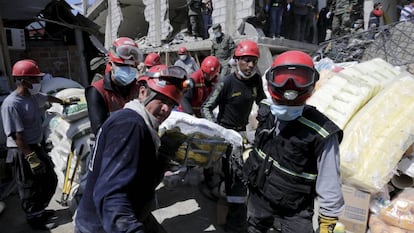Ecuador hit by new powerful tremors
Death toll rises to 525 as rescue teams begin to arrive from neighboring countries

A fresh earthquake shook the northern coast of Ecuador before dawn on Wednesday.
The 6.2-magnitude tremor was felt for around 30 seconds at 3.33am (10.33am Spanish time), and was the biggest aftershock felt since Saturday’s 7.8-magnitude quake that killed at least 525 people and injured more that 4,000. Around 1,700 people still remain unaccounted for.
The epicenter of the new tremor was 70 kilometers west-southwest of the coastal town of Esmeraldas, in the north of the country, the Pacific Tsunami Warning Center told the Reuters news agency. It was not felt in the capital, Quito, which is 214 kilometers away inland.
No official information regarding the number of victims or material damage caused by this latest tremor has been released.
Most of the population in the affected area, on the Pacific coast, has been sleeping outdoors since Saturday for fear of structural damage to the buildings that were left standing. There have been strong aftershocks since then, one on Sunday measuring 5.4 on the Richter scale .
Ecuador’s President Rafael Correa estimates the cost of the damage at around €2.6 billion, or 3% of the country’s GDP
The government says more than 400 members of rescue teams have begun to arrive from neighboring countries. Spain has sent a 50-strong team from its Military Emergency Unit (UME), which is working in the north of Ecuador. On Wednesday, some 12.5 tons of humanitarian aid left Spain aboard a military plane.
Meanwhile, the UN ACNUR refugee agency has sent tents, cooking equipment and plastic sheeting, along with 18,000 mosquito nets to help contain the risk of the Zika virus spreading.
Ecuador’s President Rafael Correa estimates the cost of the damage at around €2.6 billion, or 3% of the country’s GDP. “This will be a long fight, and we mustn’t become discouraged,” he told the nation in a televised address, going on to list the names of towns that will need to be rebuilt. The Red Cross estimates that between 70,000 and 100,000 people are in need of help and that up to 5,000 need emergency aid.
The president has also called on people still sleeping in the open air to head for shelters. “We understand the situation, but people cannot live outside. The refuges and shelters are a temporary arrangement, because we have to demolish dangerous structures and build new houses, perhaps even new neighborhoods.”
The government has also deployed some 16,000 extra police and military to areas damaged by the quake following reports of looting and theft.
A number of smaller, remote rural communities in the interior of the country have requested help, saying that aid has tended so far to go to larger towns on the coast.
English version by Susana Urra and Nick Lyne.
Sign up for our newsletter!
EL PAÍS English Edition is launching a weekly newsletter. Sign up today to receive a selection of our best stories in your inbox every Saturday morning. For full details about how to subscribe, click here.
Tu suscripción se está usando en otro dispositivo
¿Quieres añadir otro usuario a tu suscripción?
Si continúas leyendo en este dispositivo, no se podrá leer en el otro.
FlechaTu suscripción se está usando en otro dispositivo y solo puedes acceder a EL PAÍS desde un dispositivo a la vez.
Si quieres compartir tu cuenta, cambia tu suscripción a la modalidad Premium, así podrás añadir otro usuario. Cada uno accederá con su propia cuenta de email, lo que os permitirá personalizar vuestra experiencia en EL PAÍS.
¿Tienes una suscripción de empresa? Accede aquí para contratar más cuentas.
En el caso de no saber quién está usando tu cuenta, te recomendamos cambiar tu contraseña aquí.
Si decides continuar compartiendo tu cuenta, este mensaje se mostrará en tu dispositivo y en el de la otra persona que está usando tu cuenta de forma indefinida, afectando a tu experiencia de lectura. Puedes consultar aquí los términos y condiciones de la suscripción digital.








































